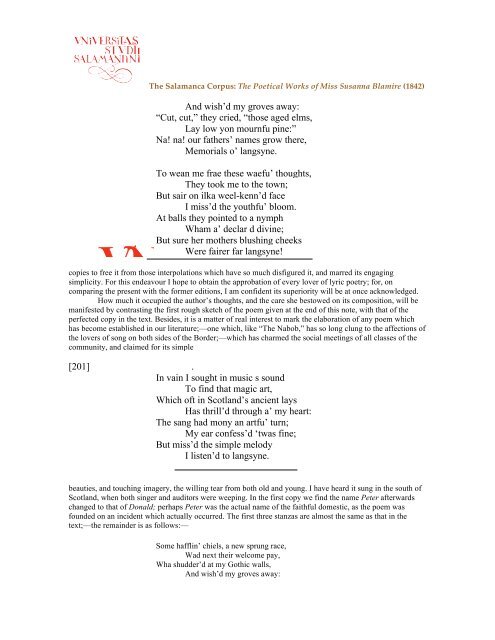The Poetical Works of Miss Susanna Blamire (1842) - Gredos ...
The Poetical Works of Miss Susanna Blamire (1842) - Gredos ...
The Poetical Works of Miss Susanna Blamire (1842) - Gredos ...
Create successful ePaper yourself
Turn your PDF publications into a flip-book with our unique Google optimized e-Paper software.
<strong>The</strong> Salamanca Corpus: <strong>The</strong> <strong>Poetical</strong> <strong>Works</strong> <strong>of</strong> <strong>Miss</strong> <strong>Susanna</strong> <strong>Blamire</strong> (<strong>1842</strong>)<br />
And wish’d my groves away:<br />
“Cut, cut,” they cried, “those aged elms,<br />
Lay low yon mournfu pine:”<br />
Na! na! our fathers’ names grow there,<br />
Memorials o’ langsyne.<br />
To wean me frae these waefu’ thoughts,<br />
<strong>The</strong>y took me to the town;<br />
But sair on ilka weel-kenn’d face<br />
I miss’d the youthfu’ bloom.<br />
At balls they pointed to a nymph<br />
Wham a’ declar d divine;<br />
But sure her mothers blushing cheeks<br />
Were fairer far langsyne!<br />
copies to free it from those interpolations which have so much disfigured it, and marred its engaging<br />
simplicity. For this endeavour I hope to obtain the approbation <strong>of</strong> every lover <strong>of</strong> lyric poetry; for, on<br />
comparing the present with the former editions, I am confident its superiority will be at once acknowledged.<br />
How much it occupied the author’s thoughts, and the care she bestowed on its composition, will be<br />
manifested by contrasting the first rough sketch <strong>of</strong> the poem given at the end <strong>of</strong> this note, with that <strong>of</strong> the<br />
perfected copy in the text. Besides, it is a matter <strong>of</strong> real interest to mark the elaboration <strong>of</strong> any poem which<br />
has become established in our literature;—one which, like “<strong>The</strong> Nabob,” has so long clung to the affections <strong>of</strong><br />
the lovers <strong>of</strong> song on both sides <strong>of</strong> the Border;—which has charmed the social meetings <strong>of</strong> all classes <strong>of</strong> the<br />
community, and claimed for its simple<br />
[201] .<br />
In vain I sought in music s sound<br />
To find that magic art,<br />
Which <strong>of</strong>t in Scotland’s ancient lays<br />
Has thrill’d through a’ my heart:<br />
<strong>The</strong> sang had mony an artfu’ turn;<br />
My ear confess’d ‘twas fine;<br />
But miss’d the simple melody<br />
I listen’d to langsyne.<br />
beauties, and touching imagery, the willing tear from both old and young. I have heard it sung in the south <strong>of</strong><br />
Scotland, when both singer and auditors were weeping. In the first copy we find the name Peter afterwards<br />
changed to that <strong>of</strong> Donald; perhaps Peter was the actual name <strong>of</strong> the faithful domestic, as the poem was<br />
founded on an incident which actually occurred. <strong>The</strong> first three stanzas are almost the same as that in the<br />
text;—the remainder is as follows:—<br />
Some hafflin’ chiels, a new sprung race,<br />
Wad next their welcome pay,<br />
Wha shudder’d at my Gothic walls,<br />
And wish’d my groves away:
















